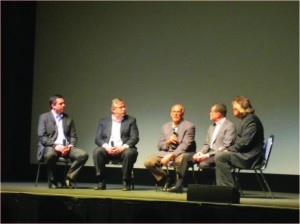
Congressman Devin Nunes held a fundraiser/movie premier on November 12 at the Visalia Fox Theatre. The movie, “Dead Harvest,” chronicled the effects of years of federal water policy, environmental lawsuits, and the four-year drought on the Central Valley. The event was free for anyone who wanted to attend.
The 35-minute documentary was created by filmmaker Ray McNally, who featured well-known Valley farmers Gus Garranza and Tulare farmer Mark Watte, as well as Congressman Nunes. The film premiered to an audience of about 700 people.
“An aggressive online campaign is underway to get the movie shown to community groups and colleges, and he plans to enter it in film festivals to give it further exposure,” McNally said. “Eventually, I’d like to show it to California lawmakers and get it aired on television in Los Angeles and San Francisco.”
Before the movie, Congressman Nunes lead a panel discussion of four water experts. Their discussion centered on water conditions affecting the Central Valley. Nunes pointed out, every year, because of Federal regulations, there is a 2.5 million acre-feet shortfall of water for Valley farmers. When the farmers don’t get their allotment of surface water they pump ground water to irrigate their crops. The underground aquifer acts as the shock absorber during a drought or when farmers do not get their contracted water from the Central Valley Project. The overdraft, and resulting subsidence, is a result of over pumping.
“We need to bring more water to the area or agriculture land will go out of production,” said Nunes.
The movie was a result of discussions that McNally had with Nunes. He felt obligated to tell the Valley’s story after seeing for himself the devastation of the drought. In preparing for the movie he realized that there was a man-made drought on top of the one brought by nature. According to the documentary, nearly one million acres have already been taken out of production in the Central Valley because of lack of water.
The film points out that three laws contributed to the man-made drought. The first one is the Central Valley Project Improvement Act (CVPIA) of 1992 which gives water back to the environment. In wet years there is plenty of water to go around, but the CVPIA has resulted in significant delivery cuts to farmers in dry years because the water for the environment is taken from their allotments. The other two laws are the Endangered Species Act and the 2009 San Joaquin River Restoration Act. The goal of the river restoration act is to restore the San Joaquin River flow so that it can support Chinook salmon that lived in abundance in the river before Friant Dam was built. The water allotted to restore the river is taken from the contracted water promised to and paid for by the farmers.
According to film makers, the three laws have contributed to about 1.4 billion gallons lost to farms since 2008. Nunes said that during his first campaign for Congress in 2002 he met environmentalists who made it clear that they wanted much of the farmland in the Central Valley to be reverted back to the desert.
The panel also pointed out that Los Angeles and San Francisco are aware that there is a drought but only see it in terms of having a brown lawn and shorter showers. They have no idea the economic devastation the drought is causing the farming industry. Large urban areas will be relieved of drought conditions with a few wet seasons, but the Central Valley will not. Attorney Victor Davis Hansen pointed out that living in Los Angeles or Silicon Valley is much more artificial (with no acquifer) than growing almonds in the Central Valley, referring to the controversy over the fact it takes one gallon of water to grow one almond.
Toward the end of the movie Nunes is quoted as saying, “they say pump water if you don’t get your surface supply, but now the government wants to regulate pumping. That is really a knife in the back.”
